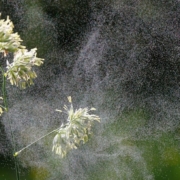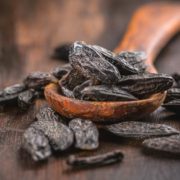Mechanism of olfactory memory
 Psycho-Aromatherapy chart of Robert Tisserand
Psycho-Aromatherapy chart of Robert Tisserand
The only way that we have to give a name to smells is to go searching into our olfactory memories for the emotions with which they were associated when memorized.
Positive or negative emotions. And all the shades in between.
We do not memorize smells by names but by emotions.
Imagine that you are a happy gazelle in the savanna. There is a smell in the air that you do not know. Then a roaring lion jumps in front of you and tries to grab you. For ever you will remember this smell with the fear that you have experienced.
There is more to it. That experience is so significant for the survival of your species that the memory of the lion’s smell will be transmitted to your progeny. This memory will be fear. not a name. Not an image. An emotion.
Do you want the proof that we are programmed to respond to smells in a certain way?
If you have a newborn baby in the family, take your scent strips and just let him smell a few (natural) ingredients. Coffee, pine, lemon, chocolate, rose, vetyver etc…
You will see his face showing all kind of expressions. Smile, dislike, curiosity, attraction, appetite, refusal…
For everyone it is very clear if we like or not a smell, but most people are not able to give a name to the most familiar aromas when they smell them out of their context or when they do not see the object that emanates it.
They say about all citruses that it is the smell of lemon, they cannot guess the name of scents such as chocolate or tobacco, and when I reveal to them the name of the aromas that they cannot name, it is for them like an illumination; True, it was so obvious! They exclaim.
This is because there are no direct connections between our primitive brain, our “crocodile brain ” (from which fear and emotions originate), and the neocortex where the center of language resides.
In order to identify an odor by its name, we must first dive back into our past and identify the period in which the emotions associated with the smell have been memorized. When we got the period we can more easily recall the place where we smelled it. When we identify the place we can then remember the emotional situations in which it was perceived, and finally, we can identify the source of the smell and give it a name.
“It brings back my childhood, the smell of the house, inside the kitchen, a spice, my mother used it to cook pies in the oven on Sundays, such e delicious smell of happy feast with all the family united, it is cinnamon” I smile. happy memory from childhood.
It is curious that our mind, the most sophisticated instrument of the creation, in order to give a name to a smell, has to follow such a contorted and long path.
This is because our sense of smell has preceded our intelligence and because in some way it is independent of it.
The capacity to give a name to smells has to be learned, it comes naturally by working with smelling ingredients. Cooks have it in measure of the ingredients they work with. Perfumers have many more ingredients to work with, although potentially cooks could use all of these in cooking (if they are natural).
This learning consists in creating shortcuts between the olfactory sense and the language centers. It is very easy.
This is the first step to acquiring the brain of a perfumer, a brain able to think with smells.
The sense of smell is the first sense to develop in a fetus, it is the first instrument of perception with which the most primitive living organisms could experience their surroundings and build a process of learning that would make them survive. It is the chemical sense.
Understanding the sense of smell, how primordial it is, what its mechanisms are, and then reflecting on what are the implications of the facts, this is how we shall be able to make perfumes with a knowledge that can give them a superior dimension.






















Leave a Reply
Want to join the discussion?Feel free to contribute!